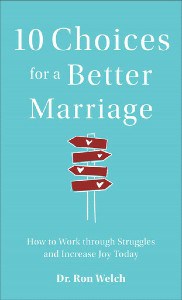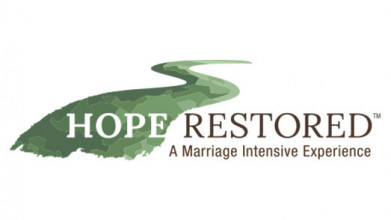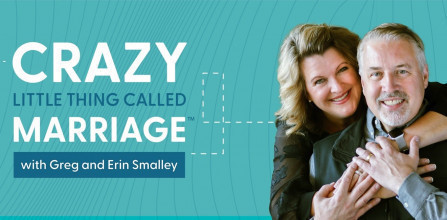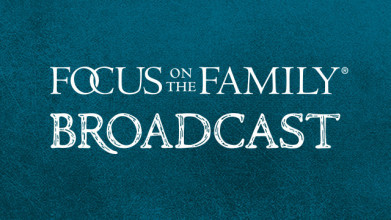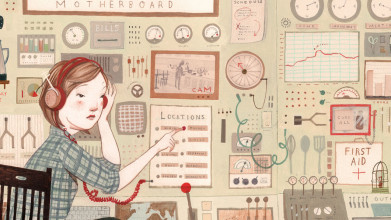Jan Welch: Once you have that kind of bond, you really want to fight for it.
Jim: Mm-hmm.
Jan: Even if it’s hard, even if it- it- it brings tears and pain, you get through it and it … Uh, we’ve done it-
Jim: Yeah.
Jan: … and I can tell you, going over that rainbow was worth every price we had to go through.
John Fuller: Well Ron and Jan Welch join us today on Focus on the Family. Your host is Focus president and author Jim Daly and I’m John Fuller.
Jim Daly: Uh, John, marriage is a unique and precious gift from God and I was reminded by a young lady not long ago, she said, “You know whenever Christians talk about marriage, sometimes they talk about it being a load or, you know, carrying, uh, this heavy burden.” And, uh, I want to say, yeah, we don’t want to project that, we wanna say marriage is awesome. Sometimes you gotta do some tune-up, you gotta, you know, you gotta pour into it, you gotta work-
John: Mm-hmm.
Jim: … at it, but, man, you put that little bit of work in and marriage is the thing that- that drives you, you know, it’s fun, it’s good, so I wanna make sure we start there. And we’re gonna talk about some of the tune-up things today-
John: Mm-hmm.
Jim: … and how to make it even better, and I hope that you will lean in with us, especially if you’re, you know, kind of in a stalled spot and you want your marriage to be all that it could be.
John: Yeah, and Dr. Ron Welch and his wife, Jan, are here to talk a little bit more about these things that can make marriage better. Uh, Ron is a clinical psychologist who specializes in marriage and family, and Jan is a teacher who works with at-risk children, and they’ve been married for over 30 years, and have two grown boys, and two grandkids. Three, okay three grandkids, correct the record there.
Jim: (laughs)
John: Uh, Dr. Welch has written a book called 10 Choices for a Better Marriage: How to Work through Struggles and Increase Joy Today. Look for details about that at focusonthefamily.com/broadcast.
Jim: Ron and Jan, it’s great to have you back to Focus.
Dr. Ron Welch: Thanks so much, we appreciate bein’ here.
Jim: Yeah, now Ron, as a psychologist, you work with couples, uh, going through some tough stuff. Does choice really factor into how you empower relationships?
Ron: You know, it- it- it has so much to do with whether people feel they have the- the power to change things. If they don’t feel there’s a choice and it’s, sort of, like, they’re stuck, this is the way it has to be, it’s the way it’s always been, so it’s probably the way it’s always going to be. Without that, it doesn’t feel like there’s any choice.
Jim: (laughs)
Ron: If you can change that one thought process, suddenly everything opens up.
John: Hm.
Jim: Well, you know, you get married, that’s a choice, right, you’re makin’ the-
Ron: Yeah.
Jim: … first big choice and then there’s a lot of choices-
Ron: (laughs)
Jim: … after that, right?
Ron: Every day, all the time, you’re always choosing your marriage and you’re choosing your partner, or you’re choosing yourself and you kinda have to make a decision about that.
Jim: Jan, we’ve covered your marital story before, but give us the recap, the quick thumbnail of you and Ron and- and how you met and married.
Jan: Uh, we were in a class at DU together and-
Jim: That’s the, uh, University of Denver.
Jan: It’s the University of Denver and the, a professor, meet, uh, talks, his first ti-, thing he says, “Is people meet and get married in this class,”-
Jim: (laughs)
Jan: … and I was, like, woo hoo.
Ron: (laughs)
John: (laughs)
Jan: I’m startin’ to look for who’s there-
Ron: (laughs)
Jan: … and, um, uh, we ended up doing a project together and then the next week-
Jim: Ah, the fatal project.
Ron: (laughs)
Jan: The fatal project, I was flirting, you know, and he’s marking these points. And, um, so we ended up going out the next week, and talked all night, and I basically thought, kind of told him, uh, “I really like you, but I can like you as a friend or maybe something more can grow.” And basically four dates and we were-
Ron: Mm-hmm.
Jim: … looking at wedding rings.
John: Oh my goodness.
Jim: Four dates?
Jan: Four dates.
Jim: Okay, wow, that seems a little fast Ron?
Jan: (laughs)
Ron: (laughs) I-
Jim: Just a little.
Ron: … I wish I could say that it was motivated by, um, some kind of cognitive thought process that made sense. Most of my family, my friends looked at me and said, “What on earth are you doin’?” Uh, to be honest, if you want the honest answer, I was afraid that if she really got to know me she probably wouldn’t want the package that I was.
John: Hm.
Jim: Wow, there’s a lot to that.
Ron: I- I pushed things-
Jim: Yeah.
Ron: … and she was, she was ready, it wasn’t like she was, uh-
Jim: Yeah.
Ron: … on a slow track, but, uh, we had to get to know each other after we got married and that’s-
Jim: Yeah.
Ron: … not what my sons, uh- uh, not the advice I give my sons-
Jan: (laughs)
Ron: … at this point.
Jim: Well, in fact you use the term fall in love, that, uh-
Ron: Hm.
Jim: … that sounds like you, like, tripped into it. But, uh, talk about your th-, use of the word fall in love, what’s that definition?
Ron: You know, for me it’s more like jumping into love. I think that’s where the choice piece comes in, it’s- it’s really a matter of saying, “I want to be with you, I want to change my life the way God wants me to change, and become the man that you deserve,” and that’s a choice, that’s jumping. That’s not just, like, uh, a passive falling into it, it’s more a matter of saying, “I’m making a conscious decision.” Now I, granted it might have been good to take longer than-
Jan: (laughs)
Ron: … four dates, but-
Jan: I do.
Jim: I- I think at-
Jan: (laughs)
Jim: … at least six dates.
Ron: At least six dates-
Jim: (laughs)
John: (laughs)
Ron: … yes, I think. (laughs)
Jim: That’s, kind of, funny. I mean Jean and I knew right away. We went to-
Ron: Uh-huh.
Jim: We … Neither one of us were dating, you know? I had given up dating for a couple years, Jean was close to that same kind of attitude.
Ron: Mm-hmm.
Jim: And a couple, a friend of ours, they had gotten married, we met at their wedding, but they, kind of, you know, kept pressing us-
Ron: Hm.
Jim: … to get together. And then they called both of us and said, “Let’s just go out as friends,” and we go to a Amy Grant concert-
Ron: Oh.
Jim: … I think it was and, uh, but we both knew that night-
Ron: Yeah.
Jim: … that this could be the one-
Ron: Yeah.
Jim: … but we were very, uh, you know, shy to share that.
Ron: Yeah- yeah.
Jim: It took months, actually probably six or seven months before we started talking, “Could this be-
Jan: Mm-hmm.
Ron: Yeah.
Jim: … it?”
Jan: Yeah.
Jim: Yeah, and it came out slowly, so. That was a little different story than yours. (laughs)
Ron: It, it’s one of those things where it might have been helpful, obviously, to know more about each other-
Jim: Yeah.
Ron: … but there was something about being on the journey together, from the very beginning.
Jan: Yeah.
Ron: Uh, both of us trying to figure out our childhoods, and our development, and who we are as people, but God used to grow us into ways … Well, I don’t know if it would have happened in a different-
Jim: Yeah.
Ron: … story, mm-hmm.
Jim: Well and the- the bottom line is you’re there-
Ron: Yup.
Jim: … uh, whether you come the way John and Dena got there, or you, or, you know, Jean and I, you end up, you’re there. How do couples choose to love each other every day once they’ve tied the knot? I- I mean that’s, kind of, interesting to choose it and keep choosing it every day you wake up.
John: Hm.
Jan: You- you don’t realize you’re making choices, but when you put the word choice in there, then you’re, like, “Oh, I do have a choice.” And sometimes it’s more difficult when things aren’t going well to smile and say, “Okay, you really want to do this, I’m in.” Uh, you know, I’d rather be sleeping, or-
Ron: (laughs)
Jan: … doing something, you know, shopping, but, you- you make those choices. And I really feel that our struggle was for a purpose. You didn’t know it then, but until he wrote, uh, these two books, ah, God-
Jim: (laughs)
Jan: … is using what we’ve gone through-
Ron: Mm-hmm, hm.
Jan: … to help others. And it was healing for us, but it’ll help, also we really wanted to help other people and, uh, you have to be honest.
Jim: Oh yeah.
Jan: We’d love to have covered some things up, but he was brutally honest-
Jim: Mm-hmm, yeah.
Jan: … and I admire that.
Jim: Ron, conflict comes to every relationship, uh, at, to a certain degree, you know, maybe a light conflict, maybe really serious conflict, but research shows it to be a little more prominent than we might expect.
Ron: Mm-hmm.
Jim: What are the research findings showing us?
Ron: You know, it’s scary. We end up entering into conflict or dealing with conflict five, six, seven times a day in a relationship. It may be “Where we gonna go for dinner,” it may be, “You did that,” or “You didn’t tell me that,” or “What do you mean you-
Jan: Bought that?
Ron: … spent that much-
Jan: Yeah. (laughs)
Ron: … or you bought that,” what … Uh- uh, but then that multiplies.
Jim: Hm.
Ron: And they tell us that there’s a couple thousand conflicts we enter into every year-
John: Hm.
Ron: … just tryin’ to negotiate.
Jim: Huh.
Ron: Well imagine what happens if a couple doesn’t have good conflict negotiation skills, or if they run away from conflict, or avoid it, or if they, if they get really aggressive with each other, if that’s your style, and that’s how you handle conflict, you do it over, and over, and over.
John: Hm.
Jim: You mention in the book, uh, some ways we can start believing in our marriages.
John: Hm.
Jim: I would think, boy, you’re, you know, the courtship side, you’re believin’ in it, you’ve said yes to each other, you get married, you’re full of belief in this being good, so, uh- uh- uh, what does that mean to s-, keep believing?
Ron: I think you very quickly have some negative experiences that break that belief system. And, you know, the research tells us we need five to seven positive things to make up for every one negative.
Jim: That’s a really important point, punch that a little bit-
Ron: Yeah, it’s-
Jim: … because I- I learned that a little late in my marriage.
Ron: … it’s hard, because if you start making a couple of observations in the morning about critical things, you’ve now got 14-
Jim: (laughs)
Ron: … positive things to say before lunch-
Jan: Mm-hmm.
Ron: … and it’s hard to do that.
Jim: Yeah.
Ron: And I find with Jan, uh, my tone of voice-
Jan: Mm-hmm-
Ron: … or my attitude-
John: (laughs)
Jan: … mm-hmm.
Ron: … can just destroy her and then, uh-
John: Hm.
Ron: … try to make up for that, and then the next day it’s, like, the last thing she remembers, my tone of voice from the day before, that’s where the patterns get broken.
Jim: Yeah, uh, we had a guest that suggested putting coins on one side of your pocket. Every time you give a complement move it-
Ron: That’s a great idea.
Jim: … from that pocket to the other pocket.
Ron: You bet.
Jim: But when you- you do something other than a complement, move that coin back-
Ron: Move it back, yeah.
Jan: Yeah.
Ron: (laughs)
Jim: … and where’s the change at the end of the day?
Ron: Outstanding.
Jim: That’s a pretty good little, uh idea.
Jan: That’s, um … I love that.
Jim: Uh, Jan, uh, I understand you and Ron like to play with a couple of stuffed cows. Now-
Jan: Hm, yeah.
Ron: (laughs)
Jim: … don’t go into much detail here, but w-, how do the cows help you?
Jan: It’s just a way … We kinda hide ’em in unique places, so, when you find it … Like, I put him ’em in the shoes, you know, when he was traveling-
Jim: (laughs)
Jan: … and, you know, you just never know where the cow will end up-
Jim: (laughs)
Jan: … and it’s- it’s just a way to, kind of, say, “I’m thinking about you, I love you, hopefully, eventually you’ll find this,” and, you know, sometimes we had two or three-
Jim: (laughs) You’ve-
Jan: … for being adventurous-
Jim: (laughs)
Jan: … so we have different, yeah.
Ron: We have several of ’em on a tree in the kitchen right-
Jan: Yeah.
Ron: … now, so they’re-
Jim: Okay, good-
Ron: (laughs)
Jim: … I was gonna say.
Jan: And it’s whichever one you want to pick up.
Jim: And you lost a cow, like, you put it somewhere and both of you-
Ron: We keep it-
Jim: … forgot where?
Jan: And then it’s really funny when, who finds it-
Jim: (laughs)
Ron: Right- right.
Jan: … uh, you know, but it’s just, kind of, a way to say, “I’m thinking of you, I love you-
Ron: Yeah.
Jim: Hm.
Jan: … you’re important to me.”
Jim: No, I love that. Yeah, and you could do it with a variety of things.
Jan: Anything.
Jim: This was the Chick-fil-A cow I believe-
Ron: (laughs)
Jan: Of course it was-
Jim: … yeah.
Jan: … our sons both work for Chick-fil-A. (laughs)
Jim: Hey, Ron, talk about the power of commitment, what does it look like to make that choice to be committed and why is it so important in a healthy marriage?
Ron: That’s a tough one, it’s gonna be a little hard to talk about it now too. Um-
Jan: Go.
Ron: … recently the last year Jan’s had some significant hospitalizations, um- um, been in situations where the doctors walked out of an ICU unit and told me that not a good likelihood she would be there the next morning.
Jim: Huh.
Ron: And, um, uh, taking care of her at home, wound care as a nurse, packing her wounds every day, and putting on wound vacs, and things that were just not what I thought husbandry would look like.
Jim: Yeah.
Ron: And then every day you’re thinking, “I can’t thank God enough for the fact that she’s here and we get another day to be together.”
Jim: Wow, there’s perspective.
Ron: And so commitment is- is saying, um, “I’m in this no matter what, for better or for worse,” right?
Jan: Right.
Ron: And that means 12:00 at night at the hospital crying my eyes out, tryin’ to figure out whether she’s gonna be there the next morning, um, that’s- that’s what commitment looks like-
Jim: Hm.
Ron: … for me anyway.
Jim: Wow, I mean that’s powerful.
Jan: And for someone who is so hard to ask for help-
Jim: Hm.
Jan: … being so helpless-
Jim: Hm.
Jan: … um, and Ron just, he stepped up so much and-
Jim: Hm.
Jan: … as, when he talks about wound care, I mean he just, yeah, he, um, beyond what I would have expected him-
Jim: Yeah.
Jan: … to, or anyone to do and he did it with a smile (laughs) on his face and love in his voice.
Jim: You know-
John: Hm.
Jim: … it’s so beautiful to hear that, and tender, I appreciate that, Ron, your- your tears-
Ron: Hm.
Jim: … ’cause it’s good.
Ron: Mm-hmm.
Jim: And, um, I’m thinking of just how the culture right now is so anti-
Ron: Hm-
Jim: … marriage.
Ron: … yeah.
Jim: You know, not everybody, but just generally.
Ron: Yeah.
Jim: So many young people here, “Oh, it’s a burden, don’t do it,”-
Ron: Right.
Jim: … you know, you gotta give up yourself for that for another person. And here I see the two of you in tears about a tough time-
Ron: Yeah.
Jim: … but the giving. Giving is not bad-
Ron: Hm.
Jim: … sacrificing is not-
Ron: No.
Jim: … bad. And in a me focused culture-
Ron: Yeah.
Jim: … uh, we really are far healthier if we could get back to, you know, this is what love and commitment looks like.
Ron: When did sacrifice become a dirty word? I don’t get that.
Jim: Yeah.
Ron: Why is it bad to give, why is it bad to- to be selfless rather than selfish.
John: Hm.
Ron: I- I don’t know where that came from, but I’m sure not happy about the direction the culture’s going and I- I don’t think that makes a healthy marriage in any way.
Jim: Yeah. Moving, um, from that kind of commitment to forgiveness-
Jan: Hm.
Ron: Sure.
Jan: … uh, man that is so essential. Talk about Charlene and Rico. I think you mentioned a story of the, about them in the book.
Ron: Sure, I mean there are situations where, um, couples end up hoping and thinking that they’ll be able to get past something, but they get stuck because they don’t know how to move forward. And I talk with couples a lot about this idea of forgiveness not just being, “Oh my bad.” You know it’s, we gotta it down to two words now, “My bad.” In some cases you just pat your chest and “We’re all good.” It’s, like, no, if you’re saying I’m sorry. One of the things we talk about in that story is saying, “That means I’m gonna work in all my power to become a better person, to not let that happen ever again.” The person who’s forgiving is gonna say, “Yeah, and I would like you to repent, I want to see some evidence that you mean it. Show me this is gonna be better.” And then when you say, “I forgive you,” it’s, like, we’re gonna actually move forward and I’m gonna believe in you in the future. That’s what that story in the book was about, was being able to say, we’re gonna be better, we’re gonna try hard, we’re not gonna be the same people, and moving forward we’re gonna be able to forgive each other and have a different relationship because of that.
John: Hm. Ron and Jan Welch are our guest today on Focus on the Family and Ron just mentioned, uh, the book that is really the foundation for our conversation today. Uh, it’s called 10 Choices for a Better Marriage: How to Work through Struggles and Increase Joy Today. And, uh, certainly we’re hearing right from their hearts. Let me encourage you to get a copy of this book, it’s just a couple of hundred pages long. As you can tell, though, it’s really deep, very practical, very deep as well. Um, find out more at focusonthefamily.com/broadcast or give us a call, 800, the letter A, and the word FAMILY.
Jim: Ron, the, that area of forgiveness, you say there are four elements. Uh, help us better understand what are those four elements?
Ron: You know, I think it starts with the idea of being able to actually, uh, think about the word repentance and I’m gonna focus on that more than any other because that word also has somehow gotten a bad rep in our world today.
Jim: Right.
Ron: It’s okay to say that you are accountable and responsible for your actions, and then in order to be forgiven, you need to repent, and you need to actually say, “Wow, I need to do some work to figure out how this happened,” rather than, “Ah, my bad, I’m sorry.”
Jim: Well, you know, you think about that, uh, that happens mostly in the covenant of marriage-
Ron: Yeah.
Jim: … I mean, really. There’s a societal application of that-
Ron: Yeah.
Jim: … you know, repentance and-
Ron: Yeah.
Jim: … that’s what criminals, the pentence-
Ron: Right-
Jim: … is where we get-
Ron: … right.
Jim: … penitentiary.
Ron: Sure.
Jim: But it, it’s an amazing thing that the core of it, I think, is in the relationship of marriage-
Ron: Yeah- yeah.
Jim: … to say you’re sorry, to be repentant.
Ron: And there’s … It’s hard sometimes because I could say I’m sorry early in our marriage, but because of many of my behaviors, and activities, and- and how I was acting, she’d hear those words and, uh, I don’t think you believed ’em.
Jan: No. I think when you are forgiving someone you’re basically saying, “I’m not gonna do that again.” I’m gonna try my very best not to treat you, or do things that- that, uh- uh- uh, that would of, what, uh, the mistake or whatever is, that I’ve done wrong-
Jim: Sure.
Jan: … and, uh, that makes a difference because we can always, we know our story. A lot of times, as he would say that, it’d be, like, “Okay,” you know, well he’s probably gonna do it tomorrow, or next week, or something.’
Jim: You didn’t believe it?
Jan: It was hard to believe when it was, kind of, consistently not, that didn’t happen. And once he started to, making those changes, then I was, kind of, like, “Eh, really, okay, ho, hum-
Jim: Hm.
Jan: … well, uh …” But you always have to praise the person for their efforts, not for their failures-
Jim: Hm.
Jan: … and that really made-
Jim: Well that’s-
Jan: … a difference.
Jim: … that’s good.
Jan: Yeah-
Ron: Hm.
Jan: … really made a difference and he worked hard, I could see it every day. And you have to believe, when someone’s really changing who they are for you-
Jim: Mm-hmm.
Ron: Hm.
Jan: … and that’s what he does every day, you know, “What can I do to help you?” And he really means it-
Jim: Wow, that’s good.
Jan: … so.
Jim: What, uh- uh … Give the four though.
Ron: So you have to apologize first. You have to repent for what you did, you have to account for yourself and take responsibility for that, and then you have to expect success from your partner.
Jim: Now that, those are good. Right there that’s, uh, worth the price of admission.
Ron: Hm.
Jan: Mm-hmm.
Jim: Um, you touched on this a bit, but, uh, if you’re not doing those things, trust is broken-
Jan: Mm-hmm.
Ron: Yeah.
Jim: … and that’s the next element in this unfolding, uh, after forgiveness you have to build trust. Why is trust such a- a big challenge? Probably the core thing, I’m just thinking in marriage generally, but Jean and I, that would be true. Trust-
Ron: Mm-hmm.
Jim: … is, kinda, the foundation of it all.
Ron: Mm-hmm.
Jan: I definitely agree with that. And when you, when it breaks, it’s such a heartache, I think, that people feel.
Jim: And it doesn’t have to be the big thing, like-
Jan: No.
Jim: … infidelity, trust can be broken every day just in the way you treat me.
Jan: Exactly.
Jim: I trusted you to love me-
Ron: Mm-hmm.
Jim: … and I don’t feel loved, that’s a broken-
Ron: Yeah.
Jim: … trust.
Jan: And for me it was, I wanted someone to love me unconditionally-
Jim: Hm.
Jan: … even with my flaws. And he, kinda, disagreed with that and it was, like, “Oh, okay, so now I have to try and be this person that you want me to be.” And it’s sometimes really hard to always live up to that and, um, rebuilding it does take time. There were times when, um, he would ask something and I would lie about it-
Jim: Mm-hmm.
Jan: … because I didn’t want him to get upset and it was easier to lie-
Jim: Mm-hmm.
Jan: … then to say whatever I’d done, when I’ve, you know,-
Jim: Mm-hmm.
Jan: … I’ve spent too much money or bought something that, oh, I probably w-, shouldn’t have done. But over time-
Jim: So you’re tryin’ to avoid pain-
Jan: Exactly.
Jim: … and- and then that probably, Ron, for you indicated, “I can’t trust her.
Jan: Nope.
Jim: It broke the trust, ’cause she’s gonna lie to me.”
Ron: Right, she’s-
Jan: Yeah.
Ron: … gonna hide it anyway-
Jim: So, man, this is-
Ron: … yup.
Jim: … a vicious cycle.
Ron: And- and-
Jan: Exactly.
Ron: … and then at the same time you’re, like, “Wow, so that’s what I’ve done to my wife, now my behavior and who I am as a person makes her scared to be honest with me.”
Jim: Let me ask you, though, how do you get to that place for you, to realize that your-
Ron: Hm.
Jim: … badgering, if I can call it that, you know, correct me if I’m wrong, but that badgering, uh- uh, for you to realize she’s now misleading because of me. That’s a big leap, rather than just put it all on her.
Ron: Well, I wish I didn’t have to say this, but I- I saw it because I saw what my sons were doing and I taught them how to treat women. I her, I saw them-
Jim: Hm.
Ron: … demanding things from her. I saw them being absolute about their beliefs about women and about men and then I realized, “Okay, I’m not only doing this to her directly, I’m teaching them how they will eventually-
Jim: Ah.
Ron: … treat their wives. That was too much and God just slapped me and said, “You gotta do somethin’, man, this is not acceptable.”
Jan: And it’s interesting, because our son, our youngest, and Rob and- and I were having a conversation and he was, like, “Why did dad change, what made him-
Jim: Hm.
Jan: … change?” I said, “Do you want the honest answer,” and he was, like, “Yeah,” and I said, “Because he saw what, how you guys were treating me-
Jim: Mm-hmm.
Jan: … and that really made him wake up and say, ‘Oh no, I don’t want another generation.’”
Ron: Yeah.
Jan: And hi-, I think his t- willingness to change really affected them as well-
Jim: Mm-hmm.
Jan: … hopefully in the positive.
Ron: Huh.
Jim: No, I mean that’s powerful. And the fact that they could see that-
Ron: Hm.
Jim: … your sons could see that, and learn that lesson with you, really.
Ron: We’ve had a lot of conversations as adults about … And they sometimes say I’m hard on myself, or a little too tough on myself, but in general I- I think-
Jan: You are sometimes.
Ron: … they experienced-
Jan: (laughs)
Ron: … they experienced a lot and they had to go through some of the same things that she went through.
Jim: Let me ask this, we only have a few minutes left, so, uh- uh, when you’re looking at all of this, uh, why do you think we so often take our spouses for granted and then what, in what ways do we do that, so we can all be more cognizant of it.
Ron: You know, I- I- I think it’s really amazing that we will say things to our spouses we won’t say to a stranger on the street. It somehow becomes okay to use a tone of voice, or be derogatory, or say, “Hey, can you do this,” and it’s, like-
Jan: Or why didn’t you do this?
Ron: Can- can you be kind and nice? I mean, somehow we take each other for granted. And one of the things I suggested, I think really helps, is to-
Jim: Hm.
Ron: … sit down at the beginning of the week and ask yourself when you’re gonna be married this week. And I ask that question with the couples I work with all the time to say, “Okay, what …” Uh, you- you look at your schedules and, you know, there’s all these appointments, and work, and church, and-
Jan: Dogs.
Ron: … and the dogs, and some guy named Frank gets in there. Everybody gets in the schedules, but your wife and your husband’s name never appear for the whole week. And I ask people to look at the schedule and say, “Let’s schedule some time for us, let’s schedule a check-in time during the middle of the week when we can say, ‘Hey, we haven’t had a chance to talk about somethin’, let’s talk about it now,’” and then schedule some time when you can just sit together, and enjoy your relationship, and be married.
Jan: Take a walk.
Ron: If you can’t look at the week and find a time to be married, how ya gonna do it successfully?
Jim: Let’s hit a couple of these marriage moments-
Ron: Sure.
Jim: … because these are really good too. Marriage moment number one, the schedule. You’ve touched on this, Ron, this is, uh, a designated time to review your and your spouse’s schedules together for the week-
Ron: Yes.
Jim: … you kinda mentioned that check-in.
Ron: Right.
Jim: So when do you guys do this?
Ron: We tend to be early, uh, early or late on Sundays. Um, a lot of times after church or in the evenings, we often go to church on Saturday evenings, um, but it’s- it’s kinda, like, “What’s the week gonna look like, are, am I gonna see you?”
Jan: Mm-hmm, hm.
Ron: Um, and there’s sometimes we look and it’s, like, “Wow, we’re gonna have to put some serious effort into this.” Um, and then the check-in is, kind of, to say, “How are we doing,” later on during the week.
Jim: Yeah, the second check-in is about r- raising issues, right, so describe that. I’m-
Ron: Right.
Jim: … I am probably-
Ron: Hm.
Jim: This is where Jean does a good job again. She’ll say, you know, “Can we talk about this,” and I’m, like, “Ah, that’s the last thing I want-
Ron: (laughs)
Jim: … to talk about.”
Jan: Yes.
Jim: “Yeah, let’s talk-
Jan: (laughs)
Jim: … about it next year, maybe next month-
Jan: Huh.
Jim: … but not now.”
Jan: Yeah.
Ron: You know, I have to tell couples, if you don’t actually have a time that you’re agreeing to have a connection, then what happens is if they’re in counseling, for instance, the only time they’re bringing things up are in counseling and they don’t learn to do that-
Jim: Hm.
Ron: … on a regular basis. So I suggest that they have their own counseling appointment, on their own, and see how it goes, and sometimes it ends quickly-
Jim: Hm.
Jan: (laughs)
Ron: … but, y- you have this time where you say, “I know this is the time for the stuff we really don’t want to talk about. And we’re gonna agree that we’re not gonna back out, we’re not gonna find a reason not to do it, we’re not gonna say, ‘Oh, man, I, I’d love to do that, but’”.
Jim: I gotta mow the lawn.
Ron: Right.
Jim: (laughs)
Ron: No, the lawn doesn’t count-
Jan: (laughs)
Ron: … it’s, like, we’re gonna show up and we’re gonna be there even for the hard stuff.
Jim: I gotta stop usin’ that excuse-
Ron: (laughs)
Jim: … okay. That last one is important, too, the date. You know, we all talk about a date night and Jean and I are pretty good about doin’ that, we go to a favorite restaurant.
Jan: Mm-hmm.
Jim: But in that context, I think one of the things we violate is we’ll bring up all the stuff we haven’t dealt with-
Ron: Yeah-
Jim: … with other, you know, where are the boys-
Ron: … yeah.
Jim: … at, what are the boys doin’-
Ron: Mm-hmm.
Jan: Right.
Jim: … and it doesn’t feel like a date. (laughs)
Ron: Right, and it can’t be, like, a movie where you sit and watch a screen for two hours, that does no good. It can’t be something where you’re just gonna be disconnected, it has to be where we’re gonna remember why we’re married.
Jim: Hm.
Ron: We’re gonna remember the feelings we had when we first decided to get engaged and we’re gonna just enjoy and share in our, in our company and be so happy that we’re together.
Jan: You know, those are the times, uh, was … It’s harder, I think, sometimes if you have children and you have to pay a babysitter.
Ron: Yeah.
Jim: Yeah.
Jan: And, you know, sometimes you can do, um, neighbors and, you know-
Ron: Yeah.
Jan: … you share, they watch it, then the other.
Ron: Yeah.
Jan: Um, but it’s just the intention of reconnecting, because as you continue on your marriage, all those memories you share with that person.
Ron: Yeah.
Jan: We can look at each other sometimes and, like, “Uh-huh- uh-huh,” you don’t even have to say-
Ron: The great pancake incident of 2019-
Jim: (laughs)
Ron: … yeah, that you- you-
Jan: Ex- exactly, you know, the flood, the fire, you know-
Ron: (laughs)
Jan: … all those fun things that we have experienced, just us-
Ron: Hm.
Jim: Yeah- yeah.
Jan: … and the moments, our children that are so special. And once you have that, kind of, bond, you really want to fight for it-
Ron: Yeah.
Jim: Mm-hmm.
Jan: … even if it’s hard, even if it- it- it brings tears and pain, you get through it and it, uh-
Ron: Yeah.
Jan: … we’ve done it-
Jim: Yeah.
Jan: … and I can tell you, going over that rainbow was worth every price-
Jim: Hm.
Jan: … we had to go through.
Jim: Yeah.
Jan: It made us stronger, it made us deeper, and, you know, writing these books really bring a lot of those out, those memories out.
Jim: Yeah, I’m sure. And we’re right at the end here and I- I think the best place to end would be for the couple that’s listening, maybe, uh, either one of them, the wife’s listening right now going, “Okay, we’ve blown so many things that I’ve heard right now, all these things that you’re talking about, uh, I’ve done ’em, or both my husband and I have done them.”
How do they, how do they r-, course correct, what are some things they can do? Obviously get the book, that’s a great way, it’s- it’s a quick read, 10-
Ron: Mm-hmm.
Jim: … Choices for a Better Marriage, it doesn’t get any easier than that, here are the 10 things to think about-
Ron: Hm.
Jim: … and you’ve touched on so many of those things. But, wh- wh- what can they do tonight that’ll be different, to rekindle that relationship and make it really good?
Ron: You know, the great thing is that God’s giving us all a new day tomorrow and we get to wake up and say, “How do we want to live this day, how do I want to love my spouse, how do I want to become the man or woman God wants me to be.” What can I say to my spouse to say, “You know what, I need to apologize, I need to repent, I need to start over.” What can we do to- tomorrow to make it a brand new day? And then if that doesn’t quite turn out right, guess what, God’s gonna give you another shot the next day-
John: Mm-hmm.
Ron: … as well.
Jim: Yeah, but, again, what a great reminder. And I want to reassert what I said from the beginning that-
Ron: Mm-hmm.
Jim: … so often we’re talkin’ about how to fix wobbly marriages-
Ron: Yeah.
Jim: … and the- the good thing is, man, when you get married just don’t let it wobble-
Ron: Yeah.
Jim: … do these things from the get-go.
Ron: Yeah.
Jim: And, uh, all the research and the studies show that the happiest people in this country-
Ron: Yeah.
Jim: … and around the world are married people with a faith in Christ-
Ron: Yeah.
Jim: … I mean that’s what-
Ron: Yeah.
Jim: We’re- we’re ahead of the game-
Ron: Yup.
Jim: … so now we just have to apply-
Ron: Yeah.
Jim: … these principles, and love each other, and respect each other, and do the things that you’ve captured in this book, and, uh, certainly the things that are captured in the book-
Jan: Mm-hmm.
Ron: Yeah-
Jim: … and, uh, and if we do those things, we will have a really fulfilling-
Ron: Yeah.
Jim: … life-long commitment to the one we love and at the end of life what’s more important?
Ron: I know.
Jim: This is it. So thank you, both, Ron and Jan.
Jan: Thank you so much.
Ron: Thank you so much for havin’ us.
John: Hm.
Jim: And let me tell ya, if you are saying, “Yeah, we need the help,” get in touch with us. Man, not only do we have this great book, 10 Choices for a Better Marriage, but also counselors and a heap of material-
John: Mm-hmm.
Jim: … to help you, including a marriage assessment and other things you could do at the Focus website that will really benefit you and get you movin’ in the right direction.
John: Yeah, donate today as you can, either a monthly gift or a one-time, uh, donation of any amount. And as our way of saying thank you for joining the support team, we’ll send a copy of the book by Ron Welch, 10 Choices for a Better Marriage. You can also access all the great materials Jim just mentioned at our website focusonthefamily.com/broadcast, or give us a call, our number is 800, the letter A, and the word FAMILY, 800-232-6459. On behalf of Jim Daly and the entire team, thanks for joining us today for Focus on the Family. I’m John Fuller inviting you back as we once again help you and your family thrive in Christ.












